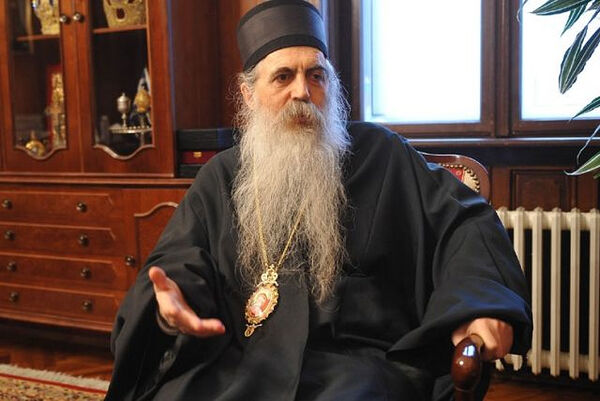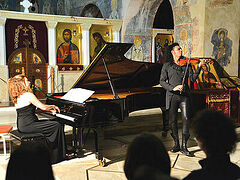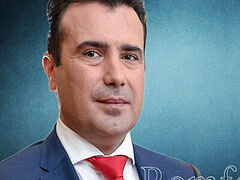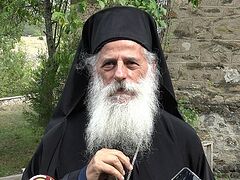Bačka, Serbia, May 13, 2021
 Bp. Irinej of Bačka. Photo: tribune.gr
Bp. Irinej of Bačka. Photo: tribune.gr
His Grace Bishop Irinej of Bačka, one of the most authoritative hierarchs of the Serbian Orthodox Church today, is encouraging the hierarchs of the unrecognized “Macedonian Orthodox Church” (MOC) to enter into dialogue with the Serbian Orthodox Church to heal the decades-long schism.
Moreover, he warns the MOC that it will lose a great deal if it attempts to receive autocephaly through the Patriarchate of Constantinople, as occurred with the “autocephaly” of the schismatic “Orthodox Church of Ukraine.”
Responding to a question from the Serbian paper Politika about the possibility of healing the Macedonian schism under the new Patriarch Porfirije, His Grace emphasizes that dialogue is truly evangelical and the only way to overcome the rift.
According to Bp. Irinej, the Serbian side has always been open to dialogue, though it’s difficult when the Macedonian side’s starting point is to demand autocephaly. Such a situation is comparable to that of the government of Kosovo, which demands recognition of its statehood and independence.
The only condition from the Serbian Church, he says, is that dialogue could not happen as long as His Eminence Archbishop Jovan and the other members of the canonical Church in Macedonia faced persecution. The Archbishop, the only hierarch of the MOC to accept the 2002 Niš Agreement, which offered full autonomy to the MOC, was jailed several times over a number of years by Macedonian authorities after he joined the canonical Serbian Church.
But once the persecution ended, the MOC turned to, instead of the Serbian Church, the Bulgarian Church and then the Patriarchate of Constantinople, both of which responded cautiously to the MOC’s entreaties.
In any case, dealing with Constantinople would prove deleterious for the MOC, believes Bp. Irinej:
“In this context, I would—honestly, truly, fraternally—ask the hierarchy in the Skopje schism a question: Have you learned anything from the Church situation in Ukraine? Do you understand what the Moscow Patriarchate gave to its Church in Ukraine, and what the Patriarchate of Constantinople gave to it—and took away?!”
Bp. Irinej is referring to the varying degrees of independence granted to the canonical Ukrainian Orthodox Church (UOC) and the schismatic “Orthodox Church of Ukraine” (OCU). The UOC enjoys complete autonomy within the Moscow Patriarchate, free to make all of its own decisions for itself without having to seek approval from the MP. On the other hand, the OCU, although officially autocephalous, enjoys less freedom, as Constantinople granted itself rights to intervene in the affairs of the OCU in the tomos granted in 2019.
Bp. Irinej continues:
Do you understand what the Serbian Church gave you with the Niš Agreement, and what the Patriarchate of Constantinople will offer you? Do you understand that you will have to hand over some holy sites to Constantinople as stavropegia, because in reality they are Greek, Byzantine shrines, such as the Nerezi Monastery near Skopje, as well as some other, including Nemanjić, Serbian sites? Do you realize that, in the end, you will have to cede all your dioceses and church communities in the diaspora to Constantinople? (I note that the Niš Agreement, that is, the love and understanding of the Serbian Church, recognizes your jurisdiction in the diaspora.).
For the OCU to receive autocephaly, Ukraine had to hand the historic St. Andrew’s Cathedral in Kiev over to Constantinople, which has made it the base of its Exarchate in Ukraine, headed by Bp. Michael (Anischenko). Former President Poroshenko also promised several other sites to Constantinople, though he was unable to fulfill this promise before losing the presidency to Vladimir Zelensky. Moreover, the OCU tomos dictates that all parishes abroad had to move under the jurisdiction of Constantinople—a stipulation that has proved rather controversial with these communities.
In addition to dialogue, Bp. Irinej continues, the other side must be free from secular pressure and instructions, and it must be ready to accept a solution that abides by the canonical tradition of the Church—not necessarily the solution they want.
The Synod of the MOC has already made its intentions quite clear, however. In December, one MOC hierarch publicly stated that a conciliar solution is needed to resolve its canonical status. The Synod responded by distancing itself from the bishop’s statement, reaffirming its intention to receive autocephaly from Constantinople.
And turning to the problem in Ukraine, Bp Irinej states that, again, dialogue is needed to resolve the situation. Talks in the format of the Amman gathering must continue, although Patriarch Bartholomew of Constantinople refuses to initiate or join such a meeting, considering himself the only one who can call a council. However, this position is far too similar to Rome’s Papal pretensions and has no foundation in Church theology or history, the Serbian hierarch says.
True primacy, he says, must not override conciliarity.
However, despite Constantinople’s anti-canonical actions in Ukraine, it has not lost its status as the first among equals, Bp. Irinej believes. It has, however, lost its reputation and trust throughout the Orthodox world. But Pat Bartholomew could redeem himself “in the blink of an eye,” Bp. Irinej believes, were he to admit his mistake in Ukraine—that he was the victim of schismatic misinformation—and revoke the OCU’s tomos of autocephaly.
“Such a gesture of his would show everyone in the world what the meaning of primacy is according to the Orthodox understanding: It is uncompromising service to the unity of the Church, whereby the First-Throne Church has the role of inspirer, mediator and coordinator, not of sole commander,” His Grace affirmed.
Follow us on Facebook, Twitter, Vkontakte, Telegram, WhatsApp, Parler, MeWe, and Gab!



